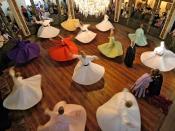A religious experience is meant to be indescribable; it is an experience from a different dimension. You get an insight into the unseen. These experiences are interpreted differently within different cultures. Religious experiences can re-affirm faith or it can even convert your faith. It can also lead to a change in behaviour or attitudes.
The term religious experience has many meanings, ranging from a perceived direct encounter with the divine, or God, to a feeling or sense of the divine that is somehow perceived within the ordinary everyday experience.
Religious experiences can be direct or indirect. Rudolf Otto rejected the idea that religion was an historical or sociological phenomenon. He argued that it was rooted in personal experience. He argues that we are able to perceive this 'experience' as a mysterious but a real object of experience. This experience is fascinating and evokes awe and wonder, provoking attraction and repulsion at the same time.
Otto argued that this perception of the holy is not the result of rational thinking or reasoning, but is a form of direct intuition.
Conversion of faith can be categorized as a religious experience. This experience can be sudden or gradual, or it can be planned or searched for. There is some sort of divine communication with a feeling of certainty.
Paul of tarsus converted to Christianity. In his account of his experience, he says that on his way to Damascus, a bright light flashed in front of him. The voice of Jesus, said to him to stop persecuting the Christians. Later he converted to Christianity.
Paul (formerly known as Saul) was a religious person; he was a practicing Jews, with a hatred for the Christians. But after his conversion he became a fully changed man. He would later become one of the outstanding figures in...



'Religious experiences present a convincing argument for the existence of God'
Fantastic argument!
0 out of 0 people found this comment useful.